by Lisa Cooke | Mar 23, 2016 | 01 What's New
This multimedia kit is a comprehensive and exciting way to learn to trace your Irish genealogy. Priced at just for EVERYTHING, you save nearly 0 on retail for a limited 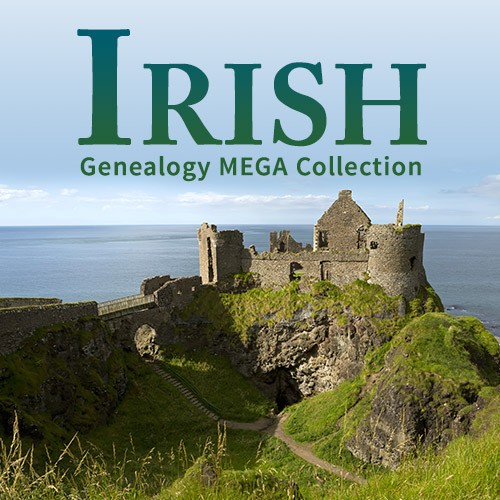 time, it’s a lucky deal, if I ever saw one!
time, it’s a lucky deal, if I ever saw one!
Tracing your Irish roots takes a bit of luck and a lot of patience. But the payoff for those who persist can be huge. The Irish have a rich history and culture that descendants love to embrace. And it’s getting more exciting to be an online Irish researcher, with important new Irish records coming online frequently.
One of the biggest Irish genealogy challenges is the destruction of the Public Records Office during the Irish Civil War. But while many records were lost, there are plenty of ways to find information on your ancestors.
Even better, during March Family Tree Magazine has slashed the price of its Irish Genealogy MEGA Collection. This comprehensive multimedia collection is a family historian’s pot of gold, packed with everything from tips on breaking down your Irish brick walls to finding vital and census records, immigration forms, and a thorough list of useful websites. Plus, you’ll get the historical background that drove emigration and affected your ancestors’ lives – as well as your research.
Here are the incredible tools you will get:
- EIGHT on-demand webinars on different aspects of Irish research
- A full-length e-book, A Genealogist’s Guide to Tracing Your Irish Ancestors
- A digital cheat sheet and an overview article for quick reference.
I love this multimedia kit because you can read, watch and learn at your own pace. The digital 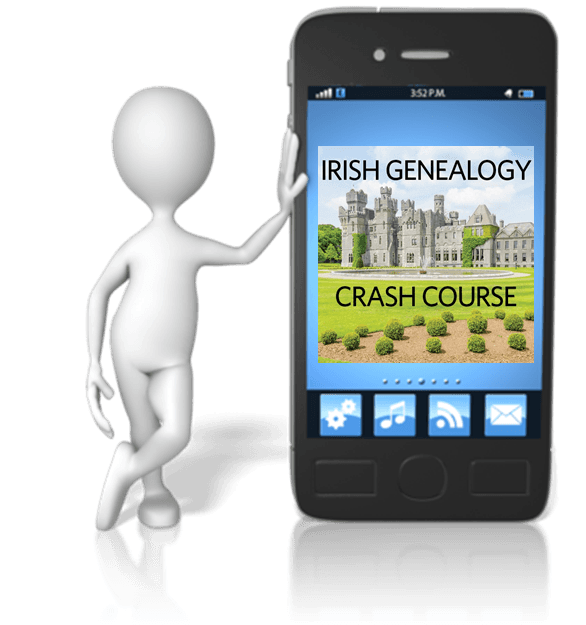 format means you can put the entire kit on your favorite mobile device. That lets you learn on-the-go and consult your reference library while you’re out researching. Of course you can use these materials on your home computer, too. The choice is yours–and with the limited-time price on this mega kit, the fabled luck of the Irish is yours, too!
format means you can put the entire kit on your favorite mobile device. That lets you learn on-the-go and consult your reference library while you’re out researching. Of course you can use these materials on your home computer, too. The choice is yours–and with the limited-time price on this mega kit, the fabled luck of the Irish is yours, too!
More Irish Genealogy Gems
by Lisa Cooke | Jul 8, 2015 | 01 What's New, Church, Irish, Libraries, Records & databases
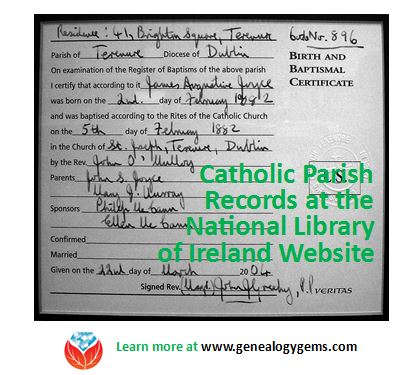
Writer James Joyce’s baptismal certificate; click to link to Wikipedia image.
As of today, the National Library of Ireland expects to launch a free, digitized collection of ALL its Catholic parish registers on its website (this link takes you to the English version; it’s also available in Irish). Nearly 400,000 digital images of microfilmed parish records comprise this collection.
According to a press release, “The parish register records are considered the single most important source of information on Irish family history prior to the 1901 Census. Dating from the 1740s to the 1880s, they cover 1,091 parishes throughout the island of Ireland, and consist primarily of baptismal and marriage records….Their digitisation means that, for the first time, anyone who likes will be able to access these registers without having to travel to Dublin.”
Catholic parish registers are a vital genealogical resource. In addition to the names of those baptized or married, they usually include those event dates, names of parents of baptized children, godparents and witnesses (who may also be relatives).
NOTE: This is a browsable-only collection. There are currently no plans to index or transcribe the records. However, the press release included a great suggestion for accessing indexes: look to local family history centers for that parish or neighborhood. “The buy diet medication online nationwide network of local family history centres holds indexes and transcripts of parish registers for their local areas,” it says.
 Those unfamiliar with Ireland research may assume this means local FamilySearch Family History Centers, but a map shows only a few of these in Ireland. I would start first with the network of county genealogy centers, accessible online at Roots Ireland. According to that site, “The county genealogy centres are based in local communities, working with volunteers, local historical societies, local clergy, local authorities, county libraries and government agencies to build a database of genealogical records for their county. By using this website you are supporting that work and the communities from which your ancestors originated.” Several counties actually already have online records you can access through the Roots Ireland link above. Ancestry also has several databases of Irish Catholic parish registers.
Those unfamiliar with Ireland research may assume this means local FamilySearch Family History Centers, but a map shows only a few of these in Ireland. I would start first with the network of county genealogy centers, accessible online at Roots Ireland. According to that site, “The county genealogy centres are based in local communities, working with volunteers, local historical societies, local clergy, local authorities, county libraries and government agencies to build a database of genealogical records for their county. By using this website you are supporting that work and the communities from which your ancestors originated.” Several counties actually already have online records you can access through the Roots Ireland link above. Ancestry also has several databases of Irish Catholic parish registers.
For more tips on researching your Irish relatives, listen to the FREE Family History Made Easy podcast episode 21, in which we interviewed Irish expert Judith Wight. You’ll hear her tips on finding Church of Ireland records, civil registrations, estate records and how history helps us understand gaps in the records.
Thank you for sharing this post with those who will LOVE to know about these Irish genealogy resources!
by Lisa Cooke | Jan 29, 2015 | 01 What's New, Census, Findmypast, Irish, Records & databases
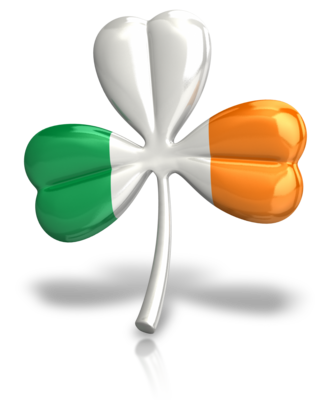 Have you ever heard of the “Irish Reproductive Relief Fund?” That name made me wonder what it was all about (and I was totally wrong). It was actually a program ahead of its time, and its records can help you trace your hard-working, poverty-stricken Irish ancestors. The records are now online for the first time at Findmypast, along with a new, easier-to-search version of the 1911 Ireland census.
Have you ever heard of the “Irish Reproductive Relief Fund?” That name made me wonder what it was all about (and I was totally wrong). It was actually a program ahead of its time, and its records can help you trace your hard-working, poverty-stricken Irish ancestors. The records are now online for the first time at Findmypast, along with a new, easier-to-search version of the 1911 Ireland census.
“The Irish Reproductive Loan Fund was a privately funded micro credit scheme set up in 1824 to provide small loans to the ‘industrious poor’ – those most affected by poverty and famine,” says a press release from Findmypast.
“This collection of almost 700,000 records, which span the period of the Irish Potato Famine, provides unique insight into the lives of those living in Ireland during one of the darkest periods in its history. The handwritten ledgers and account books reveal the changing fortunes of Irish ancestors and their subsequent movements in Ireland and across the world. Now anyone can go online and research individuals and families to find out more about where they lived, their financial situation, their social status and more besides.”
Brian Donovan, Head of Irish Data and Business Development for Findmypast, said, “These incredibly important records provide an exceptional insight into the lives of the poor across the west of Ireland from Sligo down to Cork. The people recorded are precisely those who were most likely to suffer the worst of the Famine or be forced to emigrate. These remarkable records allow us to chart what happened to 690,000 people like this from the 1820s to the 1850s, giving a glimpse of their often heart breaking accounts of survival and destitution, misery and starvation. We are very lucky to be able to tell their stories.”
These new records complement an expansive collection of Irish records at Findmypast, including Irish Petty Sessions, Irish Prison Registers, Irish newspapers, Irish Births 1864-1958 and over 800,000 Irish marriages dating back to 1619.. Another new online Irish record collection is the Clare Electoral Registers, which include early female voters.
 Here’s a tip for Irish genealogy researchers from Findmypast: “The Ireland Census 1911 is an excellent starting point for anyone researching their Irish ancestors. Findmypast’s powerful search will for the first time allow family historians to search for more than one family member at the same time, helping to narrow down results, and by birth year and by spelling variations of a name – all making it easier than ever to trace Irish ancestors.”
Here’s a tip for Irish genealogy researchers from Findmypast: “The Ireland Census 1911 is an excellent starting point for anyone researching their Irish ancestors. Findmypast’s powerful search will for the first time allow family historians to search for more than one family member at the same time, helping to narrow down results, and by birth year and by spelling variations of a name – all making it easier than ever to trace Irish ancestors.”
by Lisa Cooke | Jan 13, 2015 | 01 What's New, Australian, British, Findmypast, Irish, Military, Records & databases
Did your Irish ancestors have a dog? Over 3.5 million Irish Dog Licence registers have been added to a collection already online at
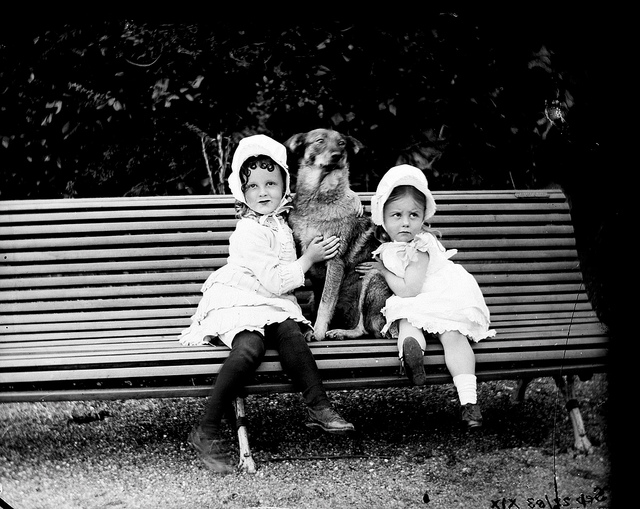
“More Besties from the Clonbrock Estate.” Taken September 22, 1883. National Library of Ireland photograph, posted at Flickr Creative Commons National Library of Ireland on the Commons page. No known copyright restrictions.
FindMyPast. “Now containing over 6 million records, the Irish Dog Licences list not only the name, breed, colour and sex of your ancestor’s four legged friend, but also the owner’s address and the date the licence was issued, making them a valuable census substitute,” says a recent FMP press release.
Also new on the site are other notable collections, as described by FMP:
- Trade Union Membership registers (3.4 million+ records) with digitized images of original records books from 9 different unions. The documents include details about individual members such as payments made, benefits received, names of spouses, and a number of unions published profiles of their members or those who held offices. Many unions kept detailed records for when a member joined, paid their subscription, applied for funeral benefits or superannuation (retirement). These records allow you to follow your ancestor’s progress within the union and perhaps uncover previously unknown details of their working lives and careers. The documents can also include details about the trade unions themselves, such as directories of secretaries, meeting dates and times and items of trade union business. Many trade unions also included international branches from Ireland to Australia to Spain and Belgium.
- Indexes to over 28,000 articles in 2000+ PERSI-indexed periodicals. These include magazines, newsletters and journals, according to location, topic, surname, ethnicity and methodology. (Learn more about PERSI on FindMyPast in our blog post on the topic.)
- Peninsular War, British Army Officers 1808-1814 dataset, compiled by Captain Lionel S. Challis of the Queen’s Westminster Rifles shortly after WW1. Using Army lists, Gazettes, despatches, official records and regimental histories, Challis gathered information on more than 9,600 officers who fought for control of the Iberian Peninsula during the Napoleonic Wars and recorded them on index cards. Each record contains an image of the original handwritten index cards and a transcript.
- South Australia Births 1842-1928. Over 727,000 records and date back to when the compulsory registration of births first began in 1842. Sourced from an index transcribed by volunteers from the South Australian Genealogy and Heraldry Society Inc., each records consists of a transcript that usually includes the child’s full name, gender, date of birth, place of birth and registration number. The names of both parents will also be included and in some cases the mother’s maiden name will also be present. South Australia’s colonial origins are unique in Australia as a freely settled, planned British province.
- South Australia Marriages 1842-1937 contain over 457,000 records. Each record includes a transcript that can contain a variety of information such as the first and last names of the bride and groom, their ages, birth years, marital status, the date and place of their marriage as well as their fathers’ first and last names.
- South Australia Deaths 1842-1972 contain over 605,000 records and span 130 years of the state’s history. Each record consists of a transcript that usually lists the deceased’s full name, gender, status, birth year, date of death, place of death, residence, the name of the informant who notified authorities of their death and their relationship to the informant.
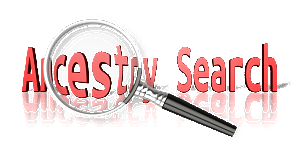 Are you making the most of your online searches at FindMyPast and other genealogy websites? What about on Google? Learn more about search strategies that work in this blog post!
Are you making the most of your online searches at FindMyPast and other genealogy websites? What about on Google? Learn more about search strategies that work in this blog post!
by Lisa Cooke | May 26, 2014 | 01 What's New, Census, Irish
If you have Irish roots, you may already know that Ireland’s National Archives has put its national 1901 and 1911 censuses online–and it’s FREE. Recently,
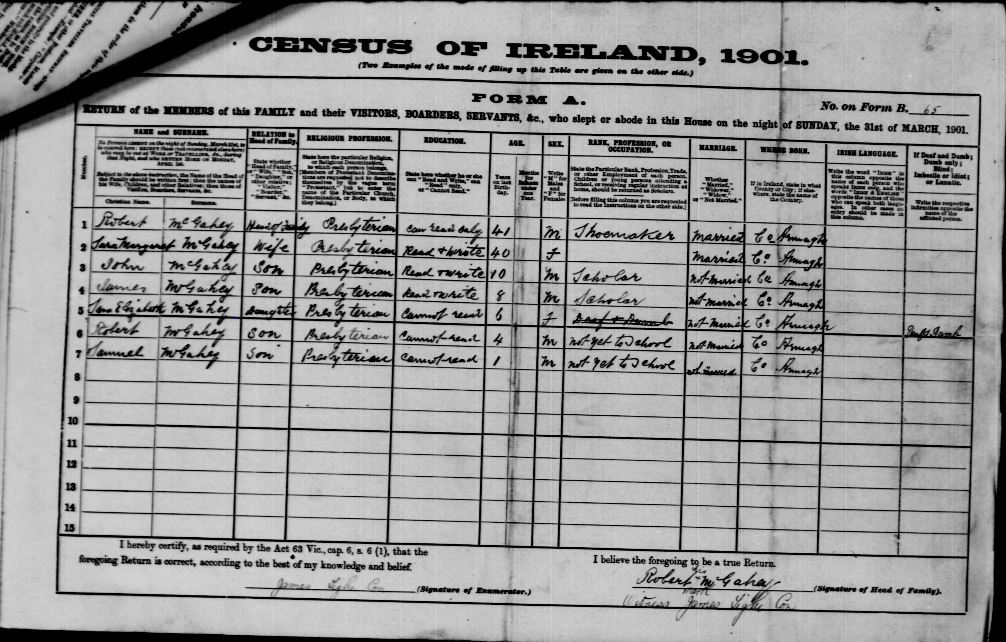
Irish census, 1901, sample image from Irish Ancestors website.
they’ve added more searchable databases and linked images. Now you can also find:
- Census Records for 1901 and 1911,
- Census survivals for 1821-51,
- Census Search forms for 1841-51,
- Tithe Applotment Books from 1823 to 1837,
- Soldiers’ Wills from 1914 to 1917, and
- the Calendars of Wills and Administrations from 1858 to 1922.
TIP: Irish census records before 1901 are disappointingly sparse. Read more about it in this article in The Irish Times, which alerted us to the new material on the National Archives site.
 time, it’s a lucky deal, if I ever saw one!
time, it’s a lucky deal, if I ever saw one! format means you can put the entire kit on your favorite mobile device. That lets you learn on-the-go and consult your reference library while you’re out researching. Of course you can use these materials on your home computer, too. The choice is yours–and with the limited-time price on this mega kit, the fabled luck of the Irish is yours, too!
format means you can put the entire kit on your favorite mobile device. That lets you learn on-the-go and consult your reference library while you’re out researching. Of course you can use these materials on your home computer, too. The choice is yours–and with the limited-time price on this mega kit, the fabled luck of the Irish is yours, too! Beginning Irish Genealogy: Free Tips and Records
Beginning Irish Genealogy: Free Tips and Records



 Here’s a tip for Irish genealogy researchers from Findmypast: “The Ireland Census 1911 is an excellent starting point for anyone researching their Irish ancestors. Findmypast’s powerful search will for the first time allow family historians to search for more than one family member at the same time, helping to narrow down results, and by birth year and by spelling variations of a name – all making it easier than ever to trace Irish ancestors.”
Here’s a tip for Irish genealogy researchers from Findmypast: “The Ireland Census 1911 is an excellent starting point for anyone researching their Irish ancestors. Findmypast’s powerful search will for the first time allow family historians to search for more than one family member at the same time, helping to narrow down results, and by birth year and by spelling variations of a name – all making it easier than ever to trace Irish ancestors.”





